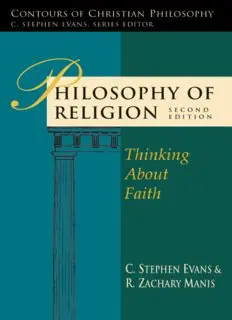
Philosophy of Religion: Thinking About Faith (Contours of Christian Philosophy) PDF
Preview Philosophy of Religion: Thinking About Faith (Contours of Christian Philosophy)
P HILOSOPHY OF RELIGION Thinking About Faith C. Stephen evanS & R. ZaChaRy ManiS SECOND EDITION InterVarsity Press P.O. Box 1400, Downers Grove, IL 60515-1426 World Wide Web: www.ivpress.com E-mail: [email protected] 2nd edition ©2009 by C. Stephen Evans and R. Zachary Manis 1st edition ©1982 by InterVarsity Christian Fellowship of the United States of America All rights reserved. No part of this book may be reproduced in any form without written permission from InterVarsity Press. InterVarsity Press® is the book-publishing division of InterVarsity Christian Fellowship/USA®, a movement of students and faculty active on campus at hundreds of universities, colleges and schools of nursing in the United States of America, and a member movement of the International Fellowship of Evangelical Students. For information about local and regional activities, write Public Relations Dept., InterVarsity Christian Fellowship/USA, 6400 Schroeder Rd., P.O. Box 7895, Madison, WI 53707-7895, or visit the IVCF website at <www.intervarsity.org>. ISBN 978-0-8308-7933-5 To Charles Evans Jr. And to Solomon Manis Contents General Preface 11 Preface to the Second Edition 13 1. What Is Philosophy of Religion? 17 Philosophy of Religion and Other Disciplines 19 Philosophy of Religion and Philosophy 21 Can Thinking About Religion Be Neutral? 22 Fideism 23 Neutralism 27 Critical Dialogue 31 2. The Theistic God: The Project of Natural Theology 36 Concepts of God 36 The Theistic Concept of God 38 A Case Study: Divine Foreknowledge and Human Freedom 42 The Problem of Religious Language 52 Natural Theology 55 Proofs of God’s Existence 57 3. Classical Arguments for God’s Existence 62 Ontological Arguments 63 Cosmological Arguments 67 Teleological Arguments 77 Moral Arguments 87 Conclusions: The Value of Theistic Argument 96 4. Religious Experience 98 Types of Religious Experience 98 Two Models for Understanding Experience 102 Experience of God as Direct and Mediated 105 Are Religious Experiences Veridical? 109 Checking Experiential Claims 112 5. Special Acts of God: Revelation and Miracles 116 Special Acts 116 Theories of Revelation 118 Is the Traditional View Defensible? 122 What Is a Miracle? 125 Is It Reasonable to Believe in Miracles? 128 Can a Revelation Have Special Authority? 135 6. Religion, Modernity and Science 138 Modernity and Religious Belief 138 Naturalism 141 Do the Natural Sciences Undermine Religious Belief? 143 Objections from the Social Sciences 147 Religious Uses of Modern Atheism? 153 7. The Problem of Evil 156 Types of Evil, Versions of the Problem and Types of Responses 157 The Logical Form of the Problem 159 The Evidential Form of the Problem 168 Horrendous Evils and the Problem of Hell 172 Divine Hiddenness 180 8. Faith(s) and Reason 183 Faith: Subjectivity in Religious Arguments 186 The Evidentialist Challenge to Religious Belief 188 Reformed Epistemology 191 The Place of Subjectivity in Forming Beliefs 195 Interpretive Judgments and the Nature of a “Cumulative Case” 198 Can Faith Be Certain? 202 Faith and Doubt: Can Religious Faith Be Tested? 207 What Is Faith? 209 Could One Religion Be True? 211 Further Reading 217 Notes 219 Index 231 General Preface T he Contours of Christian Phi- losophy series consists of short, introductory-level textbooks in the various fields of philosophy. These books introduce readers to major problems and alternative ways of dealing with those problems. How- ever, they differ from most introductory texts in that they evaluate alternative viewpoints not only with regard to their general strength but also with regard to their value in the construction of a Christian worldview. Thus, the books explore the implications of the various views for Christian theology, as well as the implications that Chris- tian convictions might have for the philosophical issues discussed. It is crucial that Christians attain a greater degree of philosophical awareness in order to improve the quality of general scholarship and evangelical theology. My hope is that this series will contribute to that end. Although the books are intended as examples of Christian schol- arship, it is hoped that they will be of value to others as well; these issues should concern all thoughtful persons. The assumption which underlies this hope is that complete neutrality in philosophy is nei- ther possible nor desirable. Philosophical work always reflects a per-
